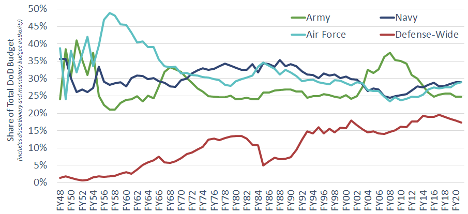
U.S. Army paratroopers deploy from Pope Army Airfield, North Carolina, on January 1, 2020. Getty Images
The ‘Rule of Thirds’ Is Bunk
The military services’ shares of overall defense spending have always fluctuated with strategy and need.
As the wait for the fiscal year 2022 budget request continues, discussion in defense policy circles is filled with expectations and predictions for the Biden administration’s first defense budget. Much of the conversation centers on the military departments’ respective shares of the Defense Department’s budget, a debate that has only intensified with the new administration revealing that it will request a slight decrease in funding for 2022, when adjusted for inflation.
Some analysts argue that particular services are better suited to deter and compete against China in the Indo-Pacific region and should receive a larger share of the budget at the expense of other services. According to those commentators, the “rule of thirds,” the notion that the military departments receive equal shares of DoD’s budget, “must be broken.” This argument also implies that the defense budget is divided among the services without regard for strategic and operational priorities.
Except the “rule of thirds” isn’t a rule and never has been. The chart below shows the military departments’ share of the DoD budget from 1948 to the 2021 request. At no time since the Air Force was created as a distinct military department by the National Security Act of 1947 have the departments received equal thirds of the budget. This is due in part to defense-wide funding for expenses not covered by the services, which has grown from 1.5 percent of the budget in 1948 to 17.9 percent in 2020. That increase stems from higher health care costs for servicemembers as well as growth in Special Operations Command, Missile Defense Agency, and classified accounts that are funded through the defense-wide portion of the budget, according to a 2020 Aerospace Corporation report.

But discounting the aggregate budget share of defense-wide accounts, the military departments’ respective budget shares have fluctuated significantly since 1948 (all budget years are fiscal years, not calendar years). The Air Force received the largest percentage of the budget from 1955 to 1967, as it developed and maintained two legs of the nuclear triad, with its share peaking at nearly 49 percent in 1957. The Navy dominated the budget between 1972 and 1983 and then again from 1986 through 2002. Operations in Afghanistan and Iraq would lead the Army to claim the largest budget share between 2004 and 2014 before the Navy reclaimed the greatest share thereafter. It’s also worth mentioning that the Air Force’s share of the budget includes classified pass-through, or “non-blue,” funding that does not actually go to the department, over 18 percent of its 2021 request.
As strategic and operational priorities change, the departments’ shares of the budget necessarily shift in favor of the organizations best equipped to realize these priorities. Each of the services has stressed their efforts to prioritize long-term strategic competition with China. But DoD will have to make tradeoffs without growth in the budget. Some commentators and analysts suggest that the Army should be the billpayer to effectively transform the joint force for potential future conflict.
Debate on the merits of each service’s assets and programs in operationalizing the defense strategy is healthy, as long as parochial interests do not distract from the joint effort to achieve the country’s defense interests. To that end, the Office of the Secretary of Defense and the Office of Cost Assessment and Program Evaluation must adjudicate between the competing forces, programs, and operational concepts to determine which align best with the Biden administration’s vision for defense. That challenge is complicated further by the need to coordinate with budget guidance from the White House’s Office of Management and Budget establishing toplines for each federal department and agency. This process has already occurred for the 2022 budget cycle, but Congress ultimately has the final say in determining how defense funding is allocated to the services.
DoD’s Joint Warfighting Concept should provide helpful guidance to delineate between the services’ respective lines of effort. However, further review of services’ roles and missions may be necessary to prevent duplication and future inter-service squabbles, particularly in what is likely to be a resource-constrained environment. The creation of the Space Force and emergence of new missions, challenges, and technology should prompt the Biden administration to review the distribution of roles among the military services to effectively prepare for long-term strategic competition and guide future budgets.
It is inevitable that each of the military departments will posture for greater budget share; the appropriations process is inherently a political exchange between the executive and legislative branches and the departments and agencies they oversee. But the Biden administration can help downplay any inter-service rivalries by providing guidance on the services’ roles in strategic competition and reviewing the existing allocation of roles and missions. The complete 2022 budget request to be released in the coming days will provide some direction of the administration’s intentions, but will not be the final answer.
NEXT STORY: Toward a New Naval Statecraft



